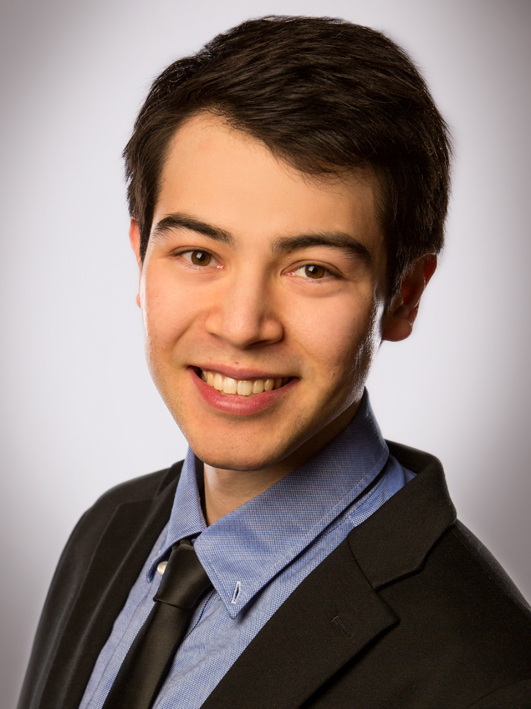Ken Jenewein
Alumni

k.jenewein@fz-juelich.de
tel: +49 (0)9131 85-20735
Time(Joined/Stayed):June 2020
Current position/Place: Erlangen, Germany
Back to team
The sun is a renewable and clean natural resource. Harvesting its energy offers a sustainable alternative to the current fossil fuel-based society for powering many industrial and consumer sectors. Photoelectrochemical (PEC) water splitting is an emerging field for directly storing solar energy in chemical bonds. Semiconductor materials acting as light absorbers must meet a vast number of requirements (bandgap, band edge position, charge transfer kinetics, earth abundance, low cost, …) to efficiently convert water into hydrogen and oxygen especially on a large scale. Although extensive research is conducted world-wide, there is yet a material to be discovered that satisfies all of the stringent conditions. In this light, high-throughput (HT) methods in synthesis and characterization present a promising route to accelerate material discovery in this field.
My research is centered around the automated synthesis of photoelectrocatalyst libraries suitable for solar fuel applications coupled with stability measurements under photoelectrochemical operation. Here, a scanning flow cell (SFC) coupled to an inductively coupled plasma mass spectrometer (ICP-MS) aides in the detection of dissolution products during irradiation and electrochemical experiments. This can help unravel degradation mechanisms occurring under real-world conditions.
-
13. In situ photocorrosion assessment of protected hematite photoanodes during accelerated stress tests
V. Benavente Llorente*, K.J. Jenewein, A. Hofer, A. Körner, A. Hutzler, A. Kormányos*, J. Bachmann, S. Cherevko*
Solar RRL
In Press
(2025)
-
K.J. Jenewein*, K. Kan, D. Guevarra, R.J.R. Jones, Y. Lai, S.K. Suram, J.A. Haber, S. Cherevko, and J.M. Gregoire*
ChemComm
60
(2024)
9554-9557
-
11. Stability of bimetallic Pt{x}Ru{y} – from model surfaces to nanoparticulate electrocatalysts
A. Kormanyos,* P. Büttner, M. Bosch, M. Minichova, A. Körner, K.J. Jenewein, A. Hutzler, K. Mayrhofer, J. Bachmann, S. Cherevko*
ACS Materials Au
4(3)
(2024)
286-299
-
K.J. Jenewein,* L. Torresi, N. Haghmoradi, A. Kormányos, P. Friederich, S. Cherevko*
Journal of Materials Chemistry A
12
(2024)
3072-3083
-
9. Photocorrosion of hematite photoanodes in neutral and alkaline electrolytes
V. Benavente Llorente,* K.J. Jenewein, M. Bierling, A. Körner, A. Hutzler, A. Kormányos,* S. Cherevko*
The Journal of Physical Chemistry C
127(39)
(2023)
19687-19697
-
8. Stability of high entropy alloys under electrocatalytic conditions
A. Kormányos,* Q. Dong, B. Xiao, T. Li, A. Savan, K.J. Jenewein, T. Priamushko, A. Körner, T. Böhm, A. Hutzler, L. Hu, A. Ludwig, S. Cherevko*
iScience
26(10)
(2023)
107775
-
7. Electrolyte engineering stabilizes photoanodes decorated with molecular catalysts
K.J. Jenewein,* Y. Wang, T. Liu, T. McDonald, M. Zlatar, V.B. Llorente, N. Kulyk, A. Kormányos, D. Wang, S. Cherevko*
ChemSusChem
16
(2023)
e202202319
-
6. Dissolution of WO3 modified with IrOx overlayers during photoelectrochemical water splitting
K.J. Jenewein,* J. Knöppel, A. Hofer, A. Kormányos, B. Mayerhöfer, F.D. Speck, M. Bierling, S. Thiele, J. Bachmann, S. Cherevko*
SusMat
3(1)
(2023)
128-136
-
K.J. Jenewein, S. Thienhaus, A. Ludwig, A. Kormányos, S. Cherevko
Chemical Science
13
(2022)
13774-13781
-
K.J. Jenewein,* G.D. Akkoc, A. Kormányos, S. Cherevko*
Chem Catalysis
2(10)
(2022)
2778-2794
-
H. Wilson, A. Van Rooij, K.J. Jenewein, J. Knöppel, A. Kormanyos, S. Cherevko, S. Sunde, A. Erbe*
Physica Status Solidi A: Applications and Materials Science
219(11)
(2022)
2100852
-
2. High-throughput workflows in the service of (photo)electrocatalysis research
A. Kormanyos,* K.J. Jenewein, S. Cherevko*
Trends in Chemistry
4(6)
(2022)
475-478
-
K.J. Jenewein*, A. Kormányos, J. Knöppel, K.J.J. Mayrhofer, S. Cherevko*
ACS Measurement Science Au
1(2)
(2021)
74–81
2025
2024
2023
2022
2021
| 2020–present | Doctoral Student at the Helmholtz Institute Erlangen Nürnberg for Renewable Energy, Erlangen, Germany |
| 2019 | Working Student at Kunkel+Partner Ingenieure GmbH, Düsseldorf, Germany Topic: Multiphysical 3D mod-el of zinc-air batteries |
| 2018 | Visiting researcher at Macromolecular Materials Group, Dr. Andrew Magenau, Philadelphia, USA Topic: Functionalization-induced self-assembly via thiol-epoxide “click” chemistry |
| 2018 | Exchange student in Material Science and Engineering at Drexel University, Philadelphia, USA |
| 2017-2018 | Research assistant at University of Applied Sciences Münster, Prof. Michael Bredol, Germany Topic: Synthesis of carbon nanotube/zinc sulfide-nanocomposites |
| 2017-2020 | M.Sc. in Chemical Engineering at the University of Applied Sciences Münster, Germany Thesis: Development of novel ORR alloy catalysts for PEM fuel cells at Robert Bosch GmbH |
| 2017 | Product development internship at Kotec Corporation, Wakayama, Japan |
| 2013-2016 | B.Sc. in Chemical Engineering at the University of Applied Sciences Münster, Germany Thesis: Development of low-loaded cathode catalyst layers for PEM fuel cells at Zentrum für BrennstoffzellenTechnik GmbH |